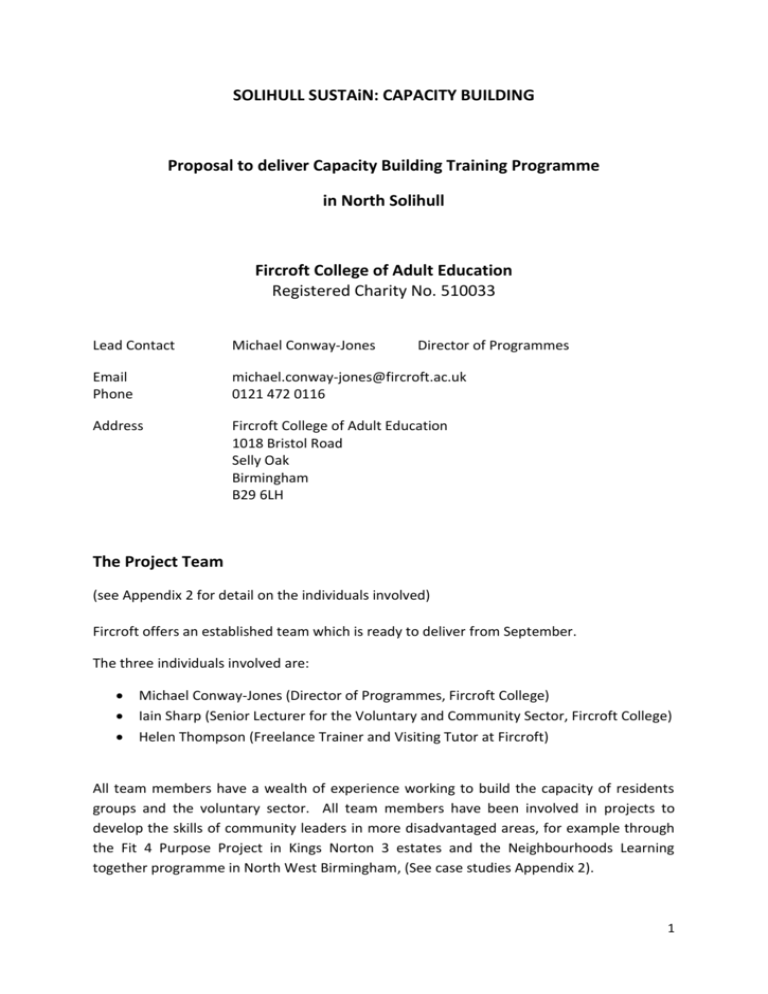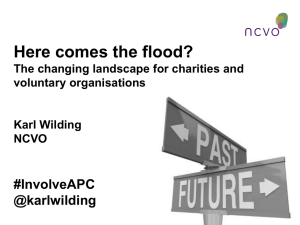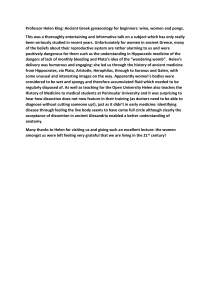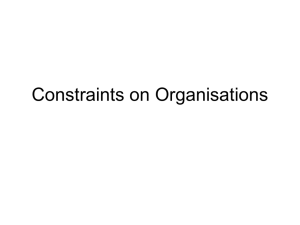Fircroft - Solihull SUSTAiN
advertisement

SOLIHULL SUSTAiN: CAPACITY BUILDING Proposal to deliver Capacity Building Training Programme in North Solihull Fircroft College of Adult Education Registered Charity No. 510033 Lead Contact Michael Conway-Jones Director of Programmes Email Phone michael.conway-jones@fircroft.ac.uk 0121 472 0116 Address Fircroft College of Adult Education 1018 Bristol Road Selly Oak Birmingham B29 6LH The Project Team (see Appendix 2 for detail on the individuals involved) Fircroft offers an established team which is ready to deliver from September. The three individuals involved are: Michael Conway-Jones (Director of Programmes, Fircroft College) Iain Sharp (Senior Lecturer for the Voluntary and Community Sector, Fircroft College) Helen Thompson (Freelance Trainer and Visiting Tutor at Fircroft) All team members have a wealth of experience working to build the capacity of residents groups and the voluntary sector. All team members have been involved in projects to develop the skills of community leaders in more disadvantaged areas, for example through the Fit 4 Purpose Project in Kings Norton 3 estates and the Neighbourhoods Learning together programme in North West Birmingham, (See case studies Appendix 2). 1 The team has different areas of expertise which compliment each other and would be used to deliver a relevant and accessible capacity building programme for North Solihull. Michael has been central in designing Fircroft’s recent capacity building projects, the Fit 4 Purpose Project in Kings Norton and Neighbourhoods Learning Together. He specialises in project management and currently delivers a leadership and management programme for the voluntary sector. Iain is Senior Lecturer at Fircroft and co-ordinates the voluntary sector programme. He specialises in business and strategic planning for voluntary sector and is the trainer on the finance, funding and book-keeping programmes. He is responsible for planning learning to meet the needs of activists and volunteers, who may have had little experience of key topics and can be unconfident in new learning environments. Helen specialises in work with resident-led groups and has a wealth of experience in capacity building training. She is a TPAS Associate and has provided training for residents groups throughout the year on writing newsletters, chairing skills, meeting skills and developing bids for fundraising. While working for a development agency, she provided training and coaching for community leaders in Sparkbrook and has delivered an accredited Community Activist programme over two years in the Birmingham area. Our Approach The project team is skilled at working with people with little experience or negative experience of learning. We are able to quickly develop an informal and relaxed learning environment and respond to individual’s differing training needs. To set up an dynamic and supportive learning environment we Value participants as local experts, using their skills and experience within sessions. Provide a wide range of stimulating and relevant learning activities. Have a practical approach; we use participant’s examples, assessing what happen’s now and how you could do it better. Participants come away with resources, completed plans and strategies to help develop their organisation. We work as joint partners with participants to plan training programmes and develop content to best meet their needs. Delivery style - Our Training is Interactive In an informal and relaxed learning environment participants are able to develop their skills and confidence. We structure group activities and encourage group discussion so participants can give each other support and learn from each other. Participants are able to 2 question and challenge issues, resulting in more active learning and a sharing of tried and tested local approaches. Relevant and Practical We will use real life examples and case studies brought along by participants. We introduce paper and on-line resources which participants can use long after the programme is over. Dynamic We respond to the current interests and needs of participants, therefore addressing many of the priority needs of their organisations. We will structure the session with a varied range of learning activities ensuring the spectrum of learning styles is met. The range of methods we use in our training includes; case studies, practise situations such as, making the case for receiving funding or chairing a meeting, discussion, using on-line tools, videos and podcasts, presentations, quizzes, games and group activities. Group sizes and session lengths When a group is too large the amount of time available to support each learner becomes noticeably restricted. However if a group is too small there are fewer opportunities to learn and be inspired by the activities run by other people in the group. We propose that ten participants is an optimal number. With ten people there are enough new ideas and diversity of voluntary sector experience to develop an excited buzz, where people begin to see different ways to successfully develop their organisations. There is also enough time to give individual attention to all in the group. If someone is struggling with relating a new approach, a group of ten means it is easier to devote one-to-one attention to an individual, helping them to move on in their learning. The community leaders targeted in this project are likely to be busy people. Voluntary activity, paid work, family and caring responsibilities take up a lot of time. For these reasons a long training day is often inappropriate for neighbourhood based training, not to mention for those people who feel daunted by the prospect of a whole day’s learning. We propose that a 2.5 - 3 hour session is appropriate for the training sessions. This time is long enough to use group activities, have a break and cover key messages in a bite-size chunk. This type of session can also be run in the evening, increasing access for those working or busy during the day. After the sessions get well-established, up to four longer sessions could be planned and timed between 9.30-2.30. This would give participants longer to practise and reflect on the more complex processes; for example in funding and finance. 3 Capacity Building Programme – Developing Community Leadership Skills The Colebridge Trust needs analysis identifies a wide range of possible training topics showing what community champions and the steering group prioritise as essential and desirable. Considering these lists and also the project aims, we have developed four topic areas to structure the training and help potential participants to understand the training programme at a glance. The diagram below illustrates the four topic areas all contributing to developing the community leadership skills required. Marketing and Your Members Running Your Group Community Leadership Skills Funding and Finance Leading People and Projects Community leaders have been actively involved in the training needs analysis and planning for this project. However, getting any new project of the ground can be a challenge. To build up support and publicise the capacity building training programme, we propose an initial phase of the project. Through a launch and networking event and neighbourhood briefings we can provide learning opportunities and tasters to encourage people to take part and sign up to the project. Phase 1 Initial Training and Engaging Leaders North Solihull Launch and Networking Event A launch event could provide an opportunity to further inform community leaders and win their commitment to the project. A briefing on the capacity building programme and a small number of tasters sessions would raise awareness of the training opportunities and 4 encourage emerging leaders to take part. In the training needs analysis, “Communication, finding out who else is doing what in the area.”, was an essential training need. Networking, showcasing and workshop sessions at this event, can be used to facilitate community groups getting to know each other and understanding how to keep in the local information loop. Neighbourhood Briefings on Community leadership Solihull Sustain is working closely with the Solihull partnership support resident-led community groups and community enterprise over the three wards. Taking briefing events to the wards; Chelmsley Wood, Smith’s Wood, Kingshurst and Fordbridge could provide be a convenient way to attract possible participants to drop into a neighbourhood centre and find out more about the programme. The briefing would include tasters on introducing of community leadership skills and would explain the training programme, encouraging participants to sign up. Phase 2 Capacity Building Training Plan The training programme below is based on the training needs analysis provided by Colebridge Trust. Structured by four topic areas the programme covers all the essential training needs and the majority of the desirables. Phase 3 Follow up Peer Mentoring To give direct ownership and promote self management, the group will be encouraged to decide how the peer mentoring sessions are organised and set the priority topics. The trainers will facilitate the sessions so as to encourage peer support, get participants to think of creative ideas and help each other to implement any new developments. It is likely the sessions will include reinforcing of information covered in training sessions giving more time to practise and reflect on training topics. The tables below summarise an outline plan Capacity Building Training Plan Phase 1 Content Initial training and engaging leaders North Solihull Launch and networking event 3 Neighbourhood briefings in Chelmsley Wood, Smiths Wood, Kingshurst and Fordbridge Phase 2 Communication, find our who else is doing what in the area - Networking Promote training and peer mentoring Provide tasters of training to encourage participation in the programme Promote training and peer mentoring Introduction to community leadership sessions 5 Capacity Building Training Plan Training Sessions Training Areas Running Your Group Leading People and Projects Funding and Finance Roles and Responsibilities in a Community Group – Getting things done! Roles and Responsibilities of a Charity Trustee Chairing Skills and Better Meetings Taking Minutes Engaging with the democratic process Leading an organisation Leading a Project Developing Teamwork Motivating your team Influencing and campaigning Managing Your Groups Finances How to identify possible sources of funding How to complete funding applications Good Practise and Top Tips to develop a project funding plan Fundraising - what to do and how to do it Marketing and Your members Marketing Your Project Developing a Community Newsletter Attracting and Involving Your Members Additional Training Topics – to be negotiated Running Your AGM Book-keeping and banking Dealing with conflict and difficult people Your voice countsl Consultation and involving your users Effective Networking Facilitate peer support, ideas and encouragement for leaders Follow up information and advice from the trainer Group problem-solving activities Negotiate style of sessions to suit group members Phase 3 Peer Mentoring Follow Up – Peer Mentoring Sessions 6 Highest Quality and Added Value with Fircroft College A Quality Provider Fircroft is an experienced provider, which has been delivering courses for community groups in the voluntary sector for many years. Specialist Coaching Fircroft has access to specialist skills such as in marketing, information technology and support to develop funding strategies. Reviewing the training needs analysis we noted that there were three areas where community leaders may benefit from individual coaching sessions with a specialist. Marketing and funding training featured highly in the essential list; with using technology; social media, word and excel noted in the desirable list. We would want our specialist coaching to provide access to one to one or small group support with a tailor made approach. This is often very effective in helping organisations take strides and get to grips with new skills. Our costing includes an element of up to thirty, one hour sessions of coaching with staff at Fircroft, in the following areas. Marketing Developing IT Skills Developing Funding Skills • advice on developing leaflets and producing marketing materials • IT training needs analysis • signpost groups on to the most convenient way of improving word or excel, on-line or face to face programmes • advice on developing a funding plan, writing applications or tailoring a funding search to a specific group. 7 An on-line information resource for the programme. For those frequently using the web we have the advantage of an on-line information resource. Through Fircroft’s Virtual Learning Environment, participants will have access to reference materials, useful websites and relevant course material. Participants can also chat on-line. This can lead to the habit of continuing to engage with each other, members of the team and building relationships for the future. Advice and guidance service For those interested in developing their skills further, we have an advice and guidance service. We can signpost on to other relevant provision or we can meet the development needs of individuals by providing places on Fircroft’s open course programme, even beyond the life of the project. Community Leadership Residential After developing their learning in neighbourhood-based training and through peer mentoring, participants have the option of taking part in a Fircroft residential programme. This would consolidate their learning on the training programme and also give them access to an accredited certificate validating their existing knowledge and learning on the course. Although a closed group residential usually has a cost of £5000, by using some of our match funding we are able to subsidise that cost down to £1418. For up to 15 people this would give a fully catered for two day break away, with a learning programme and access to all the College’s facilities, for under £100 each. Quality and Standards The quality of the learning experience through the Fircroft team is confirmed by our grade 1 ‘outstanding’ Ofsted inspection report. This includes Grade 1, `outstanding’ for community development and equality of opportunity. The QIA Quality Improvement Agency awarded Fircoft College Beacon Status in 2008. This means other training providers can be mentored and supported by Fircroft College to improve the quality of their learning provision. We also have a number of other quality kitemarks, including Investors in People The Two Ticks, Positive About Disabled People Award Matrix Advice and Guidance accreditation 8 Costings Activities Launch and training event 2 trainers Neighbourhood briefing on Community leadership Training events Follow up -Peer mentoring Specialist Coaching Additional training to be arranged Community Leadership Residential (Full Cost 5000) Programme design with Solihull Sustain Evaluation Planning, implementation and Programme Review Project Management Travel Costs Sessions 2 3 18 8 6 Days 5 4 4 Total Cost £ 880.00 £ 1,320.00 £ 7,920.00 £ 3,520.00 £ 2,400.00 £ 2,640.00 £ 1,418.00 £ £ £ £ 1,750.00 1,400.00 1,840.00 452.00 £ 25,088.00 Insurance Cover TYPE OF POLICY INSURERS RENEWAL DATE PUBLIC LIABILITY (Minimum Cover£5 million for each and every incident) NFU Mutual - £10m National Agricultural Centre Stoneleigh Park Warwickshire CV8 2LZ 31/7/2012 NFU Mutual - £1m 31/7/2012 PROFESSIONAL INDEMNITY (Minimum Cover £250,000 for each and every incident) 9 References Samuel Akintoye programme Bliss Youth group - a beneficiary of the Fit4Purpose BLISSsam@bliss4all.com 07886 279925 Kate Foley Neighbourhoods Learning Together Programme Local Housing Manager, Estate Services Birmingham City Council Level 2 , Louisa Ryland House 44 Newhall Street Birmingham B3 0121 675 2433, 07825 282468, kate.foley@birmingham.gov.uk 10 Appendix 1 Case Studies Case Study 1 Fit4Purpose on the Kings Norton 3 estates The Fields Millennium Green Trust in action Fit 4 Purpose What is it? Fit 4 Purpose was a tailored package of support for 10 voluntary and community groups on the Kings Norton 3 Estates. The aim was to secure their future and the contribution they make to the regeneration of the area. Funded by New Deal for Communities, as part of their continuation strategy, the project ran for 7 months to the end of January 2010. The groups were: Community Crafts BLISS Easy Gardening The Fields Millennium Green Little Footsteps Our Place (Kings Norton) Toddlers, Tykes and Tots TEDS 3 Estates Festival Committee Pool Farm Estate Club The project was delivered by Fircroft College linking up with South West Birmingham Community Association. 11 What happened? Each organisation had a named mentor with experience of running voluntary organisations themselves. They carried out a needs assessment, agreed an organisational development plan and continued to ensure the project delivered what that organisation needed. A small payment was made available so organisations could achieve their plan. “The Fit4Purpose project has been one of the most beneficial for community groups in Kings Norton. The delivery by Fircroft College has been exceptionally good as they have provided brilliant knowledge sharing and learning atmosphere as well as dedicated members of staff offering a consistently professional and friendly support". BLISS youth group Fircroft delivered 17 workshops and network meetings in the keys areas of funding, finance, planning, marketing and leadership. This was followed up by individual help on particular applications and initiatives. Getting more people involved was a key issue for all the groups and Fircroft worked closely with the parallel VFit project on volunteering. The project paid for free places on accredited courses and brought in specialist training in areas like IT. By the end of the project over 350 hours of support had been provided. What’s been achieved? The groups who have made most use of the project are reaping the rewards in terms of increased skills and confidence, additional funding and new initiatives. For example, TEDS launched a new cinema club for the over 60’s. Fit 4 Purpose advised on the Co-op bid which funds this and gave one to one IT support with the flyer. Fircroft and SWBCA remain a resource for the voluntary sector locally. “The courses I have attended at Fircroft College on behalf of the Fields Millennium Green Trust have given me a valuable insight into many aspects of governance, funding and marketing which should help our sustainability. We would like to thank the Fircroft team for their friendly and flexible approach to meeting our needs” Fields Millennium Green 12 Case Study 2 – Neighbourhoods Learning Together In the spring of 2011 Urban Living commissioned ‘a learning programme for a core group of community activists across a number of neighbourhoods in North West Birmingham and Sandwell. The programme was intended to: equip activists with skills and knowledge to engage with service providers and funders in shaping the future of regeneration and renewal across the Urban Living area promote cohesion, understanding and empowerment both within and between neighbourhoods and equip activists with the resilience and skills which will be more necessary than ever in the face of reducing public sector funding. The result was Neighbourhoods Learning Together - organised by Fircroft College and designed and delivered by Fircroft tutors, working jointly with Steve Skinner Associates, a training company specialising in community development. The programme was tailor-made, with workshop discussion, practical activity, videos, expert speakers, mentoring, an on-line presence and a residential weekend. 28 people took part in the project, a mixture of practitioners and activists. The programme consisted of Five Core Modules and further Optional sessions, covering areas such as Thinking Big and Leadership, Marketing and Promotion, and Practical Skills for Empowerment. 13 What project participants said “I feel stronger about planning future group activities and doing a fund raising event, something we have never done before. Getting our vision and mission statement for the website has been a real help. Overall, it has had a huge impact on me.” “The tutors knew their stuff – tailor made to working in the community. The content had a good level of depth. I came away with knowledge we can use – it hit the mark. Fircroft was an excellent venue and it was good that other local venues were used.” “The evaluation session equipped me with useful ideas about funding bids and being able to describe how we can monitor our projects. Overall I feel much more confident and competent when dealing with the council and housing associations.” What Urban Living said “At Urban Living we were delighted to work with Fircroft College in the delivery of the Neighbourhoods Learning Together programme. The values and ethos of the college chimed exactly with the empowering way that we wanted to work with local residents in making a long term difference to their neighbourhoods. The professionalism and attention to detail shown by the whole Fircroft team ensured the success of the programme and achieved the positive learning outcomes we had hoped for." Kate Foley, Head of Community and Neighbourhood Development, Urban Living 14 Appendix 2 Trainers and Facilitators Michael Conway-Jones, MEd, MCMI Director of Programmes, Fircroft College Knowledge and experience of the voluntary and community sector Michael has worked in the voluntary sector for most of his career. He was Director of a faith-based project on racism in Liverpool 8 and then ran a community facility on Galton Village in Smethwick. He developed a Know Your Neighbourhood course for Birmingham Diocese. At Fircroft he has run closed courses for a range of VCOs including Smethwick Sikh Forum, Birmingham Association of Neighbourhood Forums, MENCAP and Health Town Community Project in Wolverhampton. Michael teaches Project Management and Leadership at the college and supervises Community Placements. He wrote modules for Newman’s Foundation Degree, including the Introduction to the Voluntary Sector, and sits on their employment advisory group. He has also helped steer Newman’s incubator project for emerging VCOs. Michael was a Director of Sandwell’s Community Enterprise Development and Innovation Centre, incubating new ideas. He successfully helped new organisations, like an Out of School Club, get off the ground and helped others, like a Lunch Club, move from grant-funding to earned income. Working with visiting tutors, Michael has developed Sustainable Funding, Social Enterprise and Starting your Own Business courses at Fircroft. Knowledge and experience of regeneration programmes Michael worked on Galton Village as it was regenerated under Estate Action. His Masters is an assessment of the extent to which top-down regeneration empowered local people. In Redditch he managed the REDI Centre for the unemployed and membership of the Redditch Economic Strategy Board. He is now a Director of BEST Ltd, a consortium of 3 sector providers addressing worklessness in Birmingham. 15 Project development experience Michael ran a £4M SRB 2 Education and Training in Redditch. Over 5 years he took it from an idea to a successful exit strategy. Within Fircroft’s Management Team, Michael is responsible for external projects and has developed projects for ESF, LSC, QIA, Supporting People, Becta and Trusts. Iain Sharp BA, MBA, Cert Ed. Senior Lecturer in Voluntary and Community Development Knowledge and experience of the voluntary and community sector Iain has worked or been a volunteer in the voluntary and community sector for over 18 years. He was a founding member of a leading community development agency in Coventry and Warwickshire, Adept. He worked principally in the disadvantaged and deprived areas of the city, or with groups that are traditionally marginalised or discriminated against such as; the long-term unemployed, women and people from minority communities. Initially started with one part-time manager the agency grew to have 5 full time staff and various associates working across the region. The agency continues to exist and develop its work. Experience of the voluntary and community sector comes from work as an independent consultant and trainer, with a specialist interest in working with statutory, voluntary and community organisations principally involved with disadvantaged communities or seeking to address conditions of disadvantage. As manager of the Koco Community Resource Centre in Coventry he developed the work of the centre and undertook a complete review of its financial structure, resulting in building and stabilising core income generation and generating additional grant funding. The organisation continues to flourish and provide support to a wide range of voluntary and community organisations. Knowledge of the voluntary and community sector also comes from his work as a volunteer and local committee member within a crisis help-line service and past role as chair of a small national charity for three years. Has developed sustainable strategies for the community café at the Koco centre. Here links were made to the local FE college to provide opportunities for students, as well as placements for people with learning disabilities. This allowed access to a variety of sources of funds as well as maintain cost effective operation with a social ethos underpinning it. Within the centre utilisation of the space and ensuring a diverse range of tenants was paramount such that risks were minimised of financial collapse. Under Iain’s management the centre’s occupancy increased and diversified 16 substantially. Business planning processes were undertaken at all times to support decisions. For the national charity he was chair of, along with a small team, he developed their first national 24hr crisis helpline service utilising a single number access. He also wrote the business plan which followed their first National Lottery grant. Knowledge and experience of regeneration programmes Knowledge of regeneration activity and programmes goes back many years to include work on and with; City Challenge, the Urban Programme and various SRB bids and delivery agencies. This includes work in Coventry and Warwickshire and the wider West Midlands. Latterly support has been given to organisations seeking to access funding under New Deal for Communities and Neighbourhood Renewal Fund. An understanding of the barriers to employment and training comes from a range of work over the years with marginalised communities, and also work with organisations such as the WEA to provide accessible learning and educational opportunities. Work at the WEA included; Pathways for Personal & Professional Development within the NHS (focussing on men with no qualifications), helping adults wishing to return to learn develop their confidence and skills in written work, working with parent/guardian volunteers on placement in nursery & primary schools to identify learning and work opportunities. He worked with Redditch local regeneration partnership in revising its management structure and preparation of business plans to carry forward various projects beyond the life of the SRB programme. Project development experience Practical project development experience comes from being coordinator of a local voluntary group for seven years, chair of a small national charity, manager of a multitenanted community centre and consultant within the voluntary and community sector for over 13 years. 17 Helen Thompson M MedSci, MIfl Freelance Trainer and Visiting Tutor, Fircroft College Knowledge and experience of the voluntary and community sector Helen has worked delivering capacity building training and education in a range of settings; with the voluntary sector and for housing and regeneration agencies. Since 2006 Helen has worked delivering courses for the voluntary and community sector for Fircroft College and on a freelance basis. Earlier in her career Helen spent two years as Training and Development officer for TAF, an organization with a contract with Sandwell Council to provide training for Sandwell’s voluntary sector. Helen planned a training programme of up to 30 courses per year and delivered the majority of the courses. Providing accessible, informative and relevant courses for busy volunteers and activists was crucial and Helen grew the success of the project while working there. As Development Officer at Muath Trust, part of BVSC’s Development Agency Network, Helen trained emerging community leaders supporting them to set up and manage new groups. She provided training and mentoring for community groups in the area on developing sustainable funding, business planning, project development, consultation and user involvement. Helen developed a partnership of community groups who won a joint bid for Successful Neighbourhood Funding for holiday adventure activities for young people. As Project Trainer on an ESF Project for volunteers in Refugee Community Organisations, Helen provided accessible training and mentoring covering business planning, legal structures, strategic planning and one to one coaching. Working on a WEA women’s health project Helen delivered training the trainers programmes and women’s health sessions working with a wide range of Women’s organizations in Sandwell and Wolverhampton. Helen is a Peer Evaluator for Charities Evaluation Service, providing a PQASSO Quality Mark for voluntary sector organizations. As a volunteer herself, Helen in a member of Friends of Balsall Heath Park and is Chair of a Women’s Walking Group. Knowledge and experience of regeneration and capacity building programmes Working with resident-led groups has been an important aspect of Helen’s career. For seven years she worked as a Community Facilitator and Senior Regeneration Officer for Friendship Housing and Accord Housing. She specialised in resident 18 involvement and trained housing staff on resident involvement practise and approaches. Helen currently works as an Associate for TPAS, Tenant Participation Advisory Service. This year she ran workshops on Chairing Skills; A beginners guide and Chairing for experienced Chairs, at the TPAS conference in July 2011. As a freelance consultant, Helen worked with a resident’s group in Brandwood End to complete a survey looking at community facilities in the area. Follow up community development work included producing a facilities directory for residents in the area and supporting the residents start new events for older people. At Accord Housing, Helen was lead officer on four tenant management programmes, providing training and guidance to support tenants gain the skills to manage their own estates. The tenant group Helen was working with in Kings Norton achieved a successful ballot result at a crucial stage enabling the group to progress into their final development stage. Project Development experience Helen was Project leader on 12 month tenant involvement and consultation project with Waterloo Housing Association. Interviews were completed with fifty residents and a presentation delivered at the regional tenants conference. Helen co-ordinated neighbourhood management partnership between three housing organizations in Sparkbrook. She was responsible for capacity building work with residents groups and developed a community partnership co-ordinating environmental improvements. Helen ran Birmingham’s CiCERO programme for 2 years, raising funds and training tenants and residents in Active Citizenship, enabling residents to take part in a study visit looking at community group achievements in Brussels. Developed and delivered Community Consultant Training for Birmingham’s Enterprising Communities Team in Sparkhill, which ran three times between 2008 and 2011. 19







